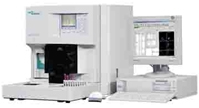Hematology analyzers are highly specialized machines used to count the number of different types of red and white blood cells, blood platelets, hemoglobin, and haematocrit levels in a blood sample. Specific results of blood tests can define many hematologic disorders. Blood analysis can detect a wide range of conditions such as anemia, diabetes, autoimmune deficiencies, infections, and cancers. It can also expose genetic information, viruses, and organ deficiencies.
These analyzers can take the form of a relatively simple handheld unit, a more sophisticated point-of-care diagnostic instrument, or a highly complex clinical laboratory analyzer. While some of them would be appropriate for an individual physician's office or point of care facility, other analyzers with capacity to analyze over 100 samples per hour can serve the needs of a busy reference laboratory. Factors that set these types of instrumentation apart from each other are sample throughput rate and the number of blood parameters measured. Pumps, syringes, motors, and tubing of the analyzer operate in conjunction with reagents, optics, and software to deliver the appropriate test results to clinicians.
A variety of automated analyzers are available that range in price and workload capacity. Most of the advanced analyzers use optical flow cytometric technologies to detect specific cell types such as red cells, white cells and platelets. For instance, Advia 2120 uses a combination of flow cytometric techniques and a cyto-chemical peroxidase stain for the five part differential.
When analyzing red blood cells, these automated devices do not depend on centrifugation techniques to determine Hct, instead do direct measurements of red cell number and red cell volume. They also have automated reticulocyte counting that allows reticulocyte counts to be included with routine complete blood count parameters.
Hematology reagents are used to dilute the blood that is being tested or differentiate or mark various cell components in the blood sample that enables further electrical and optical analyses. It can also clean the analyzer between sample analyses to prevent cross-contamination of samples.
According to the recent market report from Persistence Market Research, the major companies operating in the global hematology and reagents market are Sysmex Corporation, Abbott Laboratories, Beckman Coulter, Bio-Rad Laboratories, Inc., Mindray Medical International Limited, and Siemens Healthcare.



